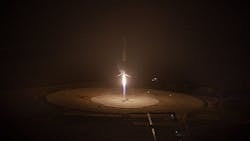SpaceX Plans Return to Flight with Jan. 8 Launch After Explosion
Space Exploration Technologies Corp. is slated to launch several Iridium communications satellites Jan. 8 from Vandenberg Air Force Base on California’s central coast, marking the company’s first return to flight since a Sept. 1 fireball destroyed a Falcon 9 rocket on a Florida launch pad.
An accident investigation team “concluded that one of the three composite overwrapped pressure vessels inside the second stage liquid oxygen tank failed,” SpaceX said Monday in a statement on its website. The September failure was likely because of an oxygen buildup or a void in the buckle in the liner of the vessel, the company said.
The announcement of a launch date means that the U.S. Federal Aviation Administration has accepted SpaceX’s investigation report regarding the Sept. 1 mishap, which founder Elon Musk has called the company’s most perplexing failure in 14 years. The blast occurred during a test firing of the rocket’s engines, destroying a Falcon 9 rocket and Amos-6, an Israeli communications satellite, at Cape Canaveral Air Force Station. No one was injured.
SpaceX is making design changes to the overwrapped pressure vessels and “corrective actions address all credible causes and focus on changes which avoid the conditions that led” to the potential reasons for the September accident, the company said.
The fiery explosion, photos of which were splashed across front pages, was a major setback in a year that also saw a spectacular, first-ever landing at sea. In April, thousands tuned into a live-stream to watch a Falcon 9 rocket launch and, roughly eight minutes later, touch down on an unmanned drone-ship bobbing in the Atlantic ocean. Reusable rockets are key to Musk’s vision of opening access to space and ultimately building a human colony on Mars.
The Iridium NEXT constellation will replace the world’s largest commercial satellite network of low-earth orbit satellites, Iridium Communications Inc. has said.
By Dana Hull and Sonali Basak
About the Author
Bloomberg
Licensed content from Bloomberg, copyright 2016.
